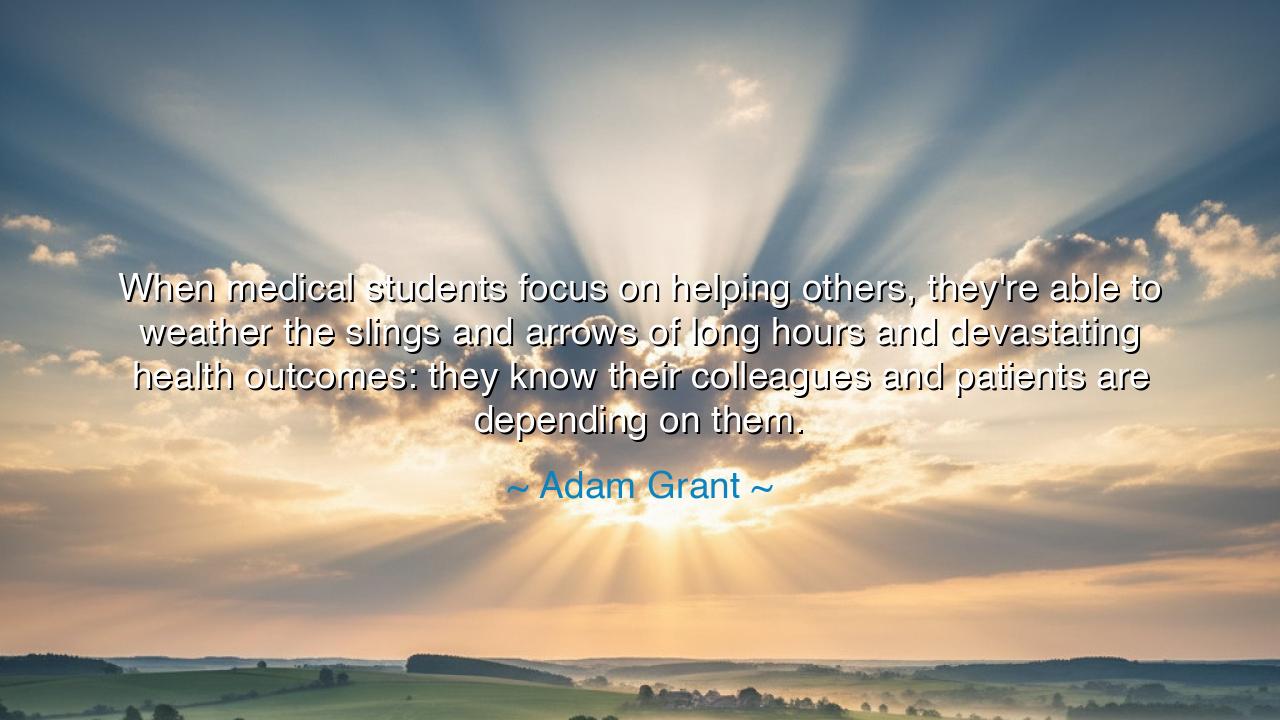
When medical students focus on helping others, they're able to
When medical students focus on helping others, they're able to weather the slings and arrows of long hours and devastating health outcomes: they know their colleagues and patients are depending on them.






Hear the words of Adam Grant, who reflects upon the spirit that sustains those who walk the hardest paths: “When medical students focus on helping others, they're able to weather the slings and arrows of long hours and devastating health outcomes: they know their colleagues and patients are depending on them.” In these words we hear not only wisdom for students of medicine, but for all who strive in the face of hardship. He declares that the secret to endurance is not found in personal ambition alone, but in service—the unshakable knowledge that others rely upon you.
The origin of this truth lies in the crucible of medical training. To be a medical student is to enter years of unrelenting labor: sleepless nights, endless study, and the constant weight of life-and-death decisions. Many falter, crushed beneath exhaustion or despair when outcomes go against them. Yet Grant reminds us that those who root themselves in helping others, rather than in prestige or self-advancement, discover a strength beyond themselves. They endure not for their own sake, but because they are bound to their patients and colleagues. This shared responsibility becomes a shield against despair.
The ancients knew this same lesson. Warriors in battle did not fight merely for their own glory, but for the comrade at their side, for the city that depended on their shield. Likewise, physicians of old, such as Hippocrates, swore not to wealth or fame, but to the sacred duty of serving the sick. To take up medicine was to join a covenant: that the healer’s body and mind would be worn down, if need be, so that others might live. Grant’s words echo this ancient vow, reminding us that devotion to others transforms suffering into purpose.
Consider the story of Dr. Paul Farmer, who labored in Haiti to bring healthcare to the poor. He endured countless obstacles: poverty, limited resources, diseases that seemed overwhelming. Yet he never turned away, for he rooted himself not in personal ambition, but in service to others. When criticized for giving too much of himself, he replied that the suffering of patients demanded nothing less. His life illustrates the principle Grant names: when the focus is outward, on the lives entrusted to you, even devastating circumstances can be endured.
The meaning of Grant’s words is therefore both motivational and deeply moral. He tells us that human beings are not sustained by ambition alone; ambition cracks under pressure. What endures is responsibility—the knowledge that others depend upon us, that their hope, their survival, their well-being are tied to our perseverance. This is the anchor that holds firm against the storms of fatigue and failure.
The lesson is clear: if you wish to endure hardship, focus not on yourself, but on those you serve. Whether you are a student, a healer, a worker, or a leader, remind yourself that your efforts ripple outward. When exhaustion whispers to quit, let the faces of those who depend on you be the fire that keeps you standing. And when despair creeps in, let service remind you that your struggle carries meaning greater than your own comfort.
Practical action follows: cultivate a habit of remembering those you serve. Write down the names of patients, colleagues, or loved ones who rely on you, and keep them near. When fatigue sets in, repeat to yourself that you labor not alone, but for them. Build a community of colleagues who share this sense of duty, so that when one falters, the others uphold them. In this way, what seems unbearable becomes endurable, because it is carried together.
Thus, Grant’s words shine as a torch for future generations. He teaches that to survive the long hours and endure the devastating outcomes, one must root themselves in service, in loyalty, and in compassion. This is not only advice for medical students, but for all humanity: when the path grows hard, look outward, not inward. For it is in helping others that we discover the strength to weather every storm, and in giving ourselves that we become unbreakable.






AAdministratorAdministrator
Welcome, honored guests. Please leave a comment, we will respond soon